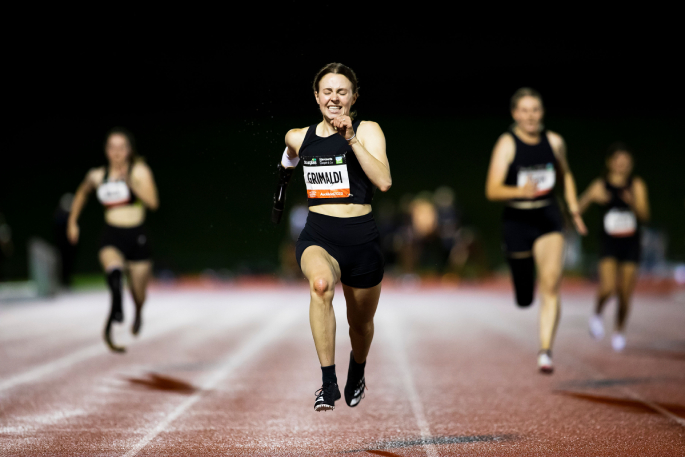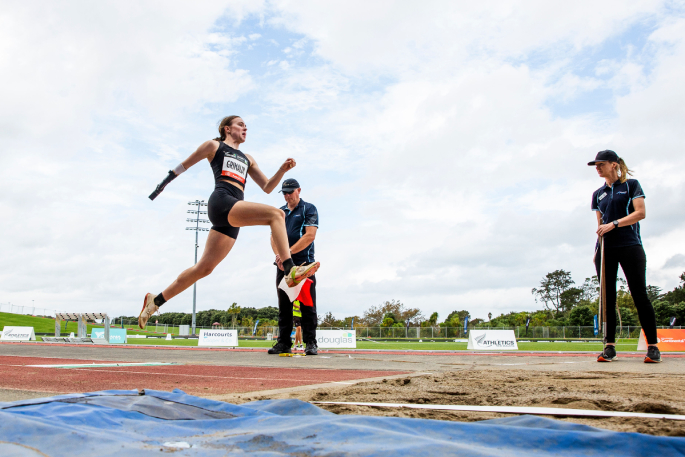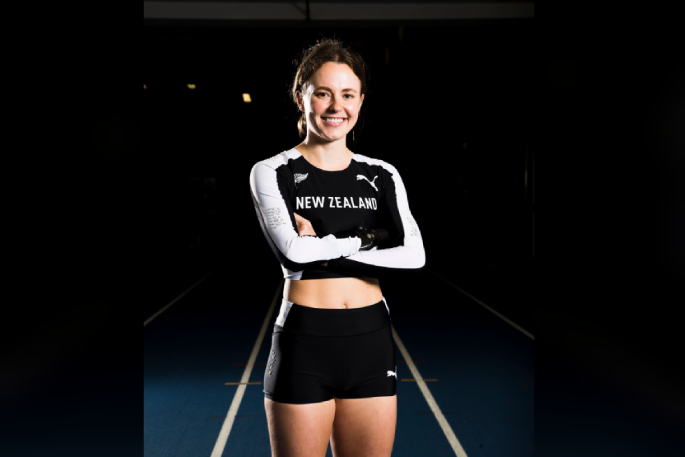Anna Grimaldi has found herself on the world stage, ready to join the very elite of New Zealand Paralympians, although for the past seven years she has battled with imposter syndrome.
The 26-year-old Kiwi achieved incredible and rapid success on the world stage as a Para T47 long jumper and her mind has taken some time to catch up.
Her trip to the Para Athletics World Championships in Paris in July was “life-changing”.
“I’ve come full circle,” says a carefree Anna, while sipping a post-training smoothie.
“I now feel comfortable with saying, ‘You know what, I am a two-time Paralympic champion. I'm one of the best in the world. I am bloody good at long jump. And I'm fast too and believe that as well. I hadn’t given myself permission to do that before.”
Anna only started long jump in 2013 when she received an email from Paralympics New Zealand inviting her to attend an athletics identification event. She decided to give it a go after some encouragement from Paralympics New Zealand team manager Raylene Bates.
 Anna Grimaldi. Photo: Supplied.
Anna Grimaldi. Photo: Supplied.
Remarkably, three years later, Anna found herself on top of the podium with a gold medal around her neck at the Rio 2016 Paralympics.
Four years on, after suffering a myriad of setbacks including a stress fracture to her foot, Anna successfully defended her Paralympics gold medal at the Covid-19 affected Tokyo Paralympics.
Now she has the chance to join the very elite of New Zealand Paralympians. In Paris, Anna has the opportunity to win her third consecutive gold medal.
There are only two New Zealand Paralympians who have achieved that feat in track and field.
Eve Rimmer, who won 14 medals from 1968 – 1980 (javelin, shot put, pentathlon and discus) and claimed four gold medals in consecutive Paralympics, and Peter Martin who won three golds in a row in the shotput F52 from 1996 – 2004.
Anna is on the cusp of greatness, and it’s been a battle so far.
“I was deeply uncomfortable with the fact that I’d been so successful, so early in my career,” she says.
“I felt like I wasn't what a gold medallist should look like, how they should be training, how they should hold themselves and how they should talk and their experience. I didn't feel like I fitted any of those supposed boxes that I felt I needed to be checked to be a gold medallist.”
The struggle was real.
The born-and-raised Dunedin athlete hated the Tokyo 2020 Paralympics experience. Even though she won gold, Anna was overcome by the pressure she had put on herself.
“Tokyo was the most stressed I have ever been in my life.
“I couldn't even string a sentence together. I was so nervous, I was looking for places to vomit mid-competition. I felt like Rio was a fluke and I was so determined to prove myself wrong.”
 Anna Grimaldi is a Para T47 athlete who has won two gold medals in track and field. Photo: Supplied.
Anna Grimaldi is a Para T47 athlete who has won two gold medals in track and field. Photo: Supplied.
Anna says if she had another experience like Japan, she would have walked away from the sport.
But after the best trip of her life – with six other New Zealand Para athletes to the World Championship – she feels free.
“It was good to unpack what that journey was like for me and the sort of the experiences that came from winning and, and my relationship with winning and being successful and how unusual that can be to struggle with being successful and why.
“I have a renewed sense of love for what my body can do. I am excited that I can push it to new levels. And I think that tour was like a part of finding myself again, and finding my love for the sport and all of the experiences it can offer, beyond the medals and success.”
When Anna lined up at the World Champs she felt okay with the fact that she might not win.
“I ended up having the most successful tour of my life, regardless of the results. It was the most freeing thing I've ever felt in my life.
“Being content with what you feel about yourself, your ability and what your body can do, that's more than a gold medal could ever offer me.”
There is irony in her self-discovery. She is now in a better position to win on the world stage than ever before.
“I feel like the weight of the world has lifted off my shoulders like I don't feel this like claustrophobic sense of expectation,” she says. “I’m proud of where I've come from and what I have achieved. it’s taken me a long time to be able to say that.”
Anna has also changed her coach to get to the next level.
Anna and her longtime coach Brent Ward parted ways and her strength and conditioning coach of nine years Michael Jacobs is now her head coach.
“I’ve just been having a lot of fun. The training is really different and its pushing me further physically and mentally than I have in the past. Me and Mikey are on the same page with how we want to approach the next year and beyond and that really excites me”
“You can't know everything. But there are people out there that know the things that you don't know. That’s what sets Mikey apart, he’s a master collaborator.
“Wardy is awesome and I loved my time working with him. He set me up to really enjoy athletics.”
Anna says it is great to see Paralympics New Zealand invest in resources to help coaches gain the skills and confidence for coaching disabled athletes.
LevelUp, which is supported by community partner ACC, is a new series of online modules for sports coaches.
“Everyone is different, and you have got to be adaptable in how you coach.
“That’s where this resource can be cool for knowing how to approach different areas or situations. You want everyone getting into Para sport to be comfortable because then they will be confident to give it a go. And you don’t know where that moment will lead.”
Anna, who was born without her right hand, has excelled against the odds.
She attended Bayfield High School in Dunedin and played netball and basketball for the school. In her final year, she was a sports prefect.
One of her first memories of being awkward about having one hand was in primary school, she’d always wear long sleeves or clothing that had pockets in them so she could hide her stump.
“One day at school, I didn't have my hoodie and my friend Jemma let me put my stump in her pocket. For some reason that made me feel more comfortable than having someone else know I had one hand.”
Her advice to other young people is it’s exhausting trying to be something you're not. It will eventually catch up to you.
“It’s more fun to be yourself. Pretending I had two hands didn't change the fact that I only had one. It just made it harder to live with the one hand I had.
“Take the opportunities when they come up and present your authentic self to them, because you don’t want to look back and have regrets.”
Anna has found herself on the world stage. She is ready to walk out in Paris in the iconic black singlet, and this time she’ll be full of belief that she deserves to be there.



0 comments
Leave a Comment
You must be logged in to make a comment.